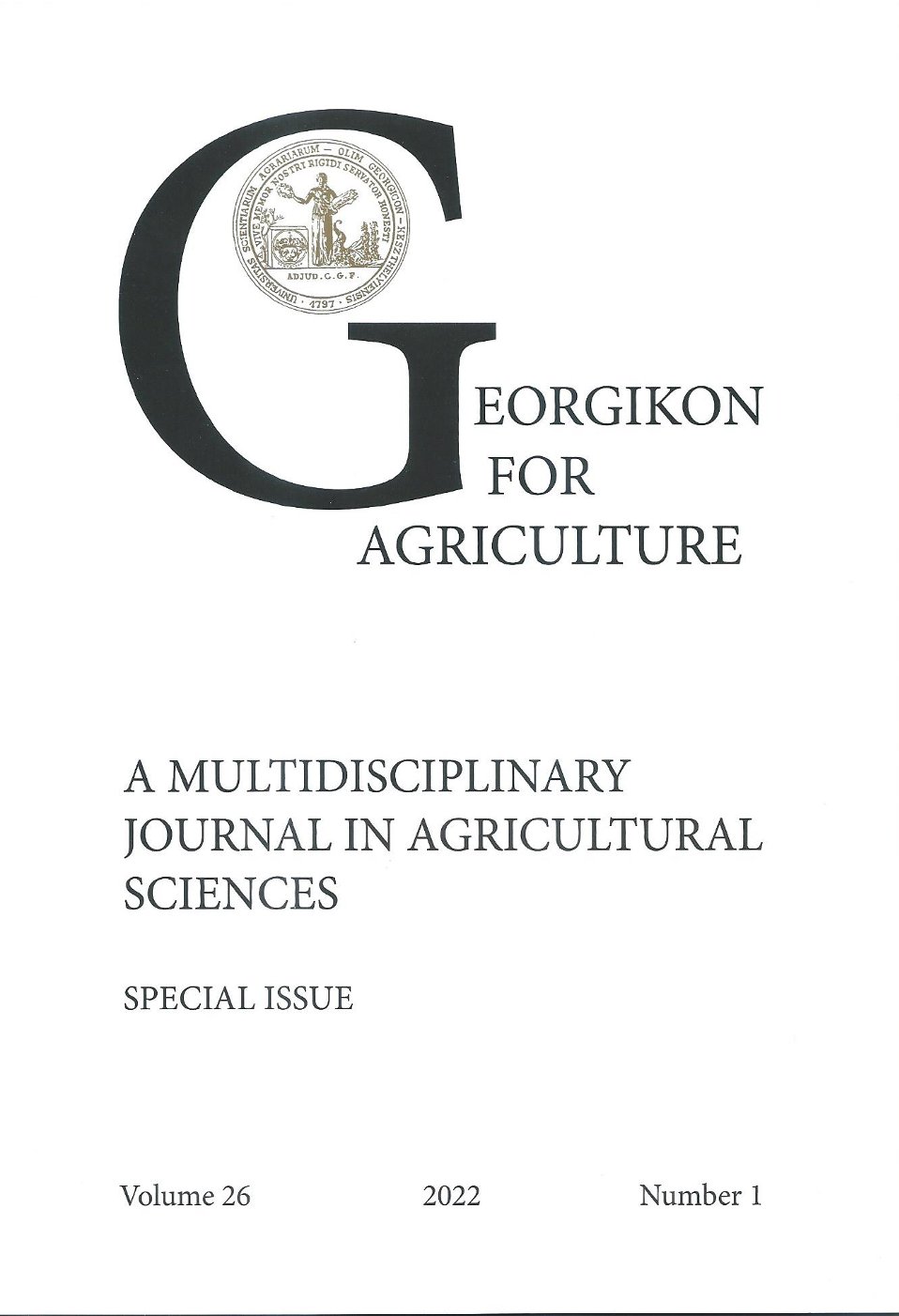Agronomic impacts on fusarium infection and mycotoxin contamination of wheat grain
Keywords:
agronomic impacts, mycotoxins, deoxynivalenol, zearalenone, fumonisinAbstract
Agronomic impacts often determine plant physiological processes. The value of grain yield may be deteriorated by fungal infections as well as contaminated by its mycotoxin metabolites. Fusarium spp. is a major plant pathogen of wheat. Fusarium infection and mycotoxin production cause serious losses in wheat and wheat-based products. Three major mycotoxins; deoxynivalenol, zearalenone and fumonisin were studied in a three years’ series of winter wheat (Triticum aestivum L.) trial at the MATE Agronomy Institute in 2018, 2019 and 2020. 3 varieties and 5 levels of N fertilization were applied in a replicated field trial. Grain samples of harvested yield were tested for Fusarium infection as well as the occurrence and magnitude of mycotoxin contamination were determined. The results obtained suggest that there were no statistically significant direct relations between the fungal infection and the presence and level of mycotoxin contamination, however certain varietal and crop year differences could be detected by fuzzy logic modelling approach for each mycotoxines.
References
Adejumo TO, Hettwer U. and Karlovsky P 2007. Occurrence of Fusarium species and trichothecenes in Nigerian maize. Int. J. Food Microbiol. 116(3). 350–357
Dexter, J., Marchylo, B., Clear, R. and Clarke, J. 1997. Effect of Fusarium Head Blight on Semolina Milling and Pasta Making Quality of Durum Wheat. Cereal Chemistry Journal. 5. 519-525.
El Chami, E., Kató, H., Csúrné Varga, A., Tarnawa, Á. and Kassai, M.K. 2020. The impact of the agrotechnology on the Fusarium infection on winter wheat and the mycotoxin production. Abstract Book. 19th Alps Adria Scientific Workshop. Wisla Poland. 88. ISBN 978-963-269-896-0 https://doi.org/10.34116/NTI.2020.AA
En.Wikipedia 2021. https://en.wikipedia.org/wiki/Fuzzy_logic downloaded 19.11.2021.
Fogarassy Cs 2000. Potenciális szántóföldi energianövényeink regionális eloszlása és egyes termesztéstechnológiai kérdései. Doktori értekezés. Regional distribution and technological aspects of potential energy crops. PhD thesis. In Hungarian. SZIE, Gödöllő.
Hárs, T. 2006. Thermal water salt content discharge. V. Alps-Adria Scientific Workshop, Opatija, Croatia, 6 - 11 March 2006. 21-24. ISSN 0133-3720
Jenkinson, P. and Parry, D. W. 1994. Isolation of Fusarium species from common broad-leaved weeds and their pathogenicity to winter wheat. Mycol. Res. 98(7). 776–780
Kassai, M. K., Tarnawa, Á., Nyárai, H. F., Szentpétery, Zs., Eser, A., Kató, H. and Jolánkai, M. 2020. Quality and quantity of winter wheat varieties in 22 years’ time range, Columella. Journal of Agricultural and Environmental Sciences. 7.(1). https://doi.org/10.18380/SZIE.COLUM.2020.7.1.5
Kende Z., Eser A., Kató H., Czerődi Kempf L., Nyárai F., Kunos V. and Szentpétery Zs. 2019. A world alimentation chance estimate based on protein production of crop species, Columella, Journal of Agricultural and Environmental Sciences. 6.(1). https://doi.org/10.18380/SZIE.COLUM.2019.6.35.
Kurtz, H. J. and J. Mirocha. 1978. Zearalenone (F2) induced estrogenic syndrome in swine. In T. D. Wyllie and L. G. Morehouse (ed.), Mycotoxic fungi, mycotoxins, mycotoxicoses, vol. 2. Marcel Dekker, New York, 1256-1264.
Marasas, W. F. O., J. D. Miller, R. T. Riley, and A. Visconti. 2001. Fumonisins-occurrence, toxicology, metabolism and risk assessment. In B. A. Summerell, J. F. Leslie, D. Backhouse, W. L. Bryden, and L. W. Burgess (ed.), Fusarium. Paul E. Nelson Memorial Symposium. APS Press, St. Paul, 332-359.
Mesterházy, Á., Lemmens, M. and Reid, L. M. 2012. Breeding for resistance to ear rots caused by Fusarium spp. in maize - A review. Plant Breeding Open Access. 131(1). 1. https://doi.org/10.1111/j.1439-0523.2011.01936.x
Mesterházy, Á., Oláh, I. and Popp, J. 2020. Losses in the grain supply chain: causes and solutions. Sustainability. 12(6). 2342. https://doi.org//10.3390/su12062342
Naguib, D. 2018. Control of Fusarium wilt in wheat seedlings by grain priming with defensinlike protein. Egyptian Journal of Biological Pest Control. 28(1).
Parry, D. W.; Jenkinson, P. and McLeod, L. 1995. „Fusarium ear blight (scab) in small grain cereals-a review”. Plant Pathology. 44(2). 207–238.
Rotter, B. A., D. B. Prelusky and J. J. Pestka. 1996. Toxicology of deoxynivalenol (vomitoxin). J. Toxicol. Environ. Health. 48. 1-34.
Salas, B, Steffenson, B, Casper, H, Tacke, B, Prom, L, Fetch, T. Jr. and Schwarz, P. 1999. Fusarium species pathogenic to barley and their associated mycotoxins. Plant Dis. 83(7). 667–677.
Downloads
Published
Issue
Section
License
Copyright (c) 2022 Elias El Chami, Josepha El Chami, Ákos Tarnawa, Katalin M. Kassai, Zoltán Kende, Márton Jolánkai

This work is licensed under a Creative Commons Attribution-NonCommercial-NoDerivatives 4.0 International License.
Cikkre a Creative Commons 4.0 standard licenc alábbi típusa vonatkozik: CC-BY-NC-ND-4.0. Ennek értelmében a mű szabadon másolható, terjeszthető, bemutatható és előadható, azonban nem használható fel kereskedelmi célokra (NC), továbbá nem módosítható és nem készíthető belőle átdolgozás, származékos mű (ND). A licenc alapján a szerző vagy a jogosult által meghatározott módon fel kell tüntetni a szerző nevét és a szerzői mű címét (BY).




